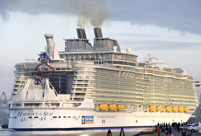

Sanford University, June 23, —— Representatives of Chinese entrepreneurs and venture capitalists discussed opportunities and collaborations at the 7th Global Entrepreneurship Summit kicked off by the U.S. Secretary of State John Kerry on Thursday at Stanford University.
Helen Qiao, Chief Economist for Greater China, Bank of America/Merrill Lynch moderated a panel with Feng Deng, founder of Northern Light Venture Capital, Jean Liu, President, DiDi Chuxing, and
Shoucheng Zhang, founder of Danhua Capital and professor of physics, Stanford University talking about China’s entrepreneurship.
Helen Qiao said that “China has become a pure capital importer to an exporter, that’s really something phenomenal.” She said that “Made in China” in the past was labeled as something equivalent as lower-quality consumer products. That’s changing. China now is on the edge of smart phones, PCs, not mention robotics, and other technologies and interesting ideas.
She asked Deng about the opportunities lying in China’s transition from a manufacturing based and heavily investment-driven economy to a more service-based economy, as well as a consumption-driven economy. Deng said that he can identify three specific areas: consumption, Internet Plus and online education.
He said that with the goring middle class, Chinese people’s lifestyles have changed. He took the high-speed railway as an example: when the high-speed railway was debut, people doubted that whether it could have passengers because rich people may take airplanes while poor people may take slower-speed trans. However, three years after the launch of the high-speed railway, people rushed to buy second-class the coach. Another two years Later, people found that it was difficult to get the first-class seats. “That’s a very good indication that middle class people has started to change to live a high quality life. Consumer spending during the last five years are growing. Although the economy is going down , the consumption power is not.”
A wave of start-ups has swept China after Chinese Premier Li called for efforts to boost mass innovation and entrepreneurship. “Internet plus traditional industry is one of the most renowned innovation in China,” said Jean Liu, “Didi is an example.” She said that Didi cooperated with Lyft, a San Francisco-based car-sharing company. If people have the Dili App, they can use here directly in the United States. “Even People’s cannot speak English, they can still use Lyft here.”
That’s one of collaborations between China and the United States. Professor Shoucheng Zhang said that mass innovation in China now has very positive effect. People are dedicated to entrepreneurship and they keep learning. “I think we could have some collaborations in some areas, such as AR and VR.” Entrepreneurs could do manufacturing in China, seek investment in China and find markets in Silicon Valley.
The 2016 Global Entrepreneurship Summit is predicted to attract about 15,000 attendees during the three days. The event provided an opportunity for entrepreneurs from around the world to hear from successful Silicon Valley CEOs, meet investors, and connect with government resources.
At today’s opening ceremony, John Kerry asked all the entrepreneurs to consider three "generational challenges" when starting their business. The world is moving faster than ever, he said, and we won’t be able to keep up without the contributions of this generation’s entrepreneurs.
He said that educational tools could help reach the young, disenfranchised youth around the world who may be at risk of being radicalized. Green startups could help the public and private sector switch to a low-carbon and low-emissions economy. And software that tracks money and accountability might cut down on corruption.
Uber CEO Travis Kalanick and Airbnb CEO Brian Chesky also attended the event and shared their views about their own business. Travis Kalanick even explained Uber’s resistance toward using fingerprint criminal background checks, saying it is a system that keeps innocent and reformed individuals out of the workforce while also making it slower for the company to add more drivers.
The summit was launched by U.S. president Obama in 2010. And he will delivered a speech on Friday morning to encourage the entrepreneurs across the globe at Stanford University.
 |
 Five made-in-China hi-tech breakthroughs
Five made-in-China hi-tech breakthroughs Beijing Style: Hot pants
Beijing Style: Hot pants HK-Zhuhai-Macao Bridge to open to traffic
HK-Zhuhai-Macao Bridge to open to traffic China opens its first combined transport service to Nepal
China opens its first combined transport service to Nepal Students take stylish bikini graduations photos
Students take stylish bikini graduations photos Charming dancing students pose for graduation photos
Charming dancing students pose for graduation photos Guizhou, Yunnan section of Shanghai-Kunming railway connected
Guizhou, Yunnan section of Shanghai-Kunming railway connected Naked models transformed into landscapes, birds and even DRAGONS by body painting artist
Naked models transformed into landscapes, birds and even DRAGONS by body painting artist World’s biggest cruise ship Harmony of the Seas to start maiden voyage
World’s biggest cruise ship Harmony of the Seas to start maiden voyage Top 20 hottest women in the world in 2014
Top 20 hottest women in the world in 2014 Top 10 hardest languages to learn
Top 10 hardest languages to learn 10 Chinese female stars with most beautiful faces
10 Chinese female stars with most beautiful faces China’s Top 10 Unique Bridges, Highways and Roads
China’s Top 10 Unique Bridges, Highways and Roads Dog meat delicacy
Dog meat delicacy Don’t group ‘Asian Americans’ together
Don’t group ‘Asian Americans’ together Shark protection needs more than losing taste for fin soup
Shark protection needs more than losing taste for fin soup When Western junk food hits Chinese tastebuds, unexpected new flavors emerge
When Western junk food hits Chinese tastebuds, unexpected new flavors emergeDay|Week